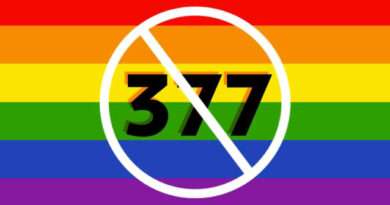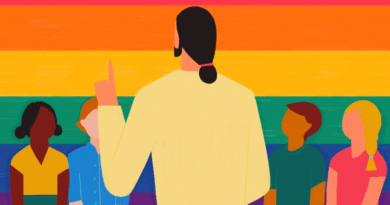Combating Rainbow Washing this Pride Month
Pride month is just around the corner, and the marketing departments of various corporations are busy designing performative Pride campaigns to mask the organisation’s ignorance of the LGBTQ+ community all year round. As soon as June rolls around, many of these corporations will change their colours like chameleons and pretend to be allies of the community without having any history of making efforts for workplace inclusion or advocating for equal rights for the LGBTQ+ community.
What is Rainbow Washing, and why is it problematic?
“Queer liberation not rainbow capitalism” by JIP is licensed under CC BY-SA 4.0.
Over the last few years, a new trend has emerged in the global era of capitalism known as Rainbow Washing. Rainbow washing refers to the marketing tactic used by companies to attract LGBTQ+ customers by pretending to be an ally of the queer community. The capitalist move involves changing logos to include the colours of the Pride flag, designing posters stating ‘Love is Love’, rolling out rainbow-themed merch, putting Pride flags at storefronts, and releasing ads featuring same-sex couples. While all these attempts at inclusion might seem like a welcoming change, they are designed mainly by companies to increase their profits and get brownie points for accepting diverse identities.
The issue with rainbow washing is that the majority of these companies only care about the LGBTQ+ community during the month of June. Their allyship is rarely reflected in their workplace culture, hiring processes, or donations during the rest of the year. What’s worse is a lot of these corporations fund anti-LGBTQ organisations as well as lawmakers who draft harmful bills targeted at queer individuals. The most recent example of a company which has previously run Pride campaigns but cannot be termed an ally is Ola. The founder of Ola, Bhavish Aggarwal’s recent rant on what he terms ‘pronoun illness’, is the most visible example of how companies are often run by intolerant leaders, and they only care about Pride when it benefits their sales and public image.
Another issue with rainbow washing is that it ignores the ethos of Pride, which has its roots in protest, and turns it into an exploitative marketing tool to garner profits. It flips the marginalised nature of queer identities and puts them into the mainstream without actually acknowledging their conditions of marginality and the causes behind their exclusion. By ignoring the decades of effort by LGBTQ+ activists, allies, and non-governmental organisations, these companies turn Pride into a capitalistic endeavour where being queer must involve being out, wearing rainbow merch, and flaunting one’s queerness to be accepted. What is ironic is that these companies do not provide their employees with safe environments to come out because they do not have policies that protect LGBTQ+ individuals from harassment in the workplace. Therefore, their superficial engagements with the LGBTQ+ community do more harm than good.
Combating Rainbow Washing and Supporting Queer-owned Businesses
Screenshot of Rainbow Bazaar’s website: https://shop.thepridecircle.com/
One way to combat rainbow washing is to evaluate the company’s efforts of LGBTQ+ inclusion and figure out if they have published any data about hiring LGBTQ+ candidates. It is also essential to assess their workplace policies, dress codes, work culture, and affiliations with LGBTQ+ NGOS to gauge whether the company is just fishing for attention or if it is actually invested in furthering the cause for equality. Doing a background check will help find corporations that are working for the community, and they will prove to be better investments since supporting them will benefit LGBTQ+ individuals.
While assessing a company, it is essential to check whether the company has policies for transgender individuals who are often denied employment due to their identity or are forced to quit due to a lack of support from the management. If the company with the rainbow logo during Pride month does not provide health insurance that is inclusive of HRT and SRS to trans employees, does not have gender-neutral washrooms, and has a gendered dress code masked under the garb of professionalism, then it is just a quack dressed in ally’s clothing. Citing ‘Love is Love’ is not enough, and if the company does not have inclusive policies that provide benefits to same-sex couples, then is it really an ally?
Supporting queer-owned businesses is the best way to avoid feeding into rainbow capitalism. By buying from queer individuals, you can directly contribute to their financial independence and subsequent freedom from unsupportive families. Moreover, it is the most effective way to ensure that you are profiting individuals who are advocating for the rights of LGBTQ+ individuals while also creating a safe space for queer identities to not just survive but thrive. It is essential to buy from queer-owned businesses all year round and not just during Pride month since they need profits to sustain themselves, and June isn’t the only month when one should think of queer identities. Shopping from queer-owned businesses will also ensure that your hard-earned money does not go into funding anti-LGBTQ+ movements or corporations that care little about diversity, equity, and inclusion.
Going beyond Consumerism
Pride is essentially a protest against oppressive regimes, discriminatory practices, and violence meted out to the LGBTQ+ community. It is important to remember that the journey of progress is long and can only be carried forward through sustained effort. One cannot simply gain rights by adding them to cart on an e-commerce website. One has to fight for them, advocate for them, and struggle for a long time before they are granted. Therefore, the celebration of Pride, both at the personal and the corporate level, needs to go beyond consumerism. Pride month should not be reduced to buying/selling rainbow merchandise or increasing the market value of a company. Instead, it should be about providing visibility to queer folks who aren’t just white, cis-gendered, or savarna individuals, but come from diverse racial, ethnic, disabled, caste, and class backgrounds. The best way to celebrate pride is to incorporate allyship into daily life by creating safe spaces in communities, workplaces, and beyond.
Citations
Image Source:
https://commons.wikimedia.org/wiki/File:Queer_liberation_not_rainbow_capitalism.jpg https://shop.thepridecircle.com/



